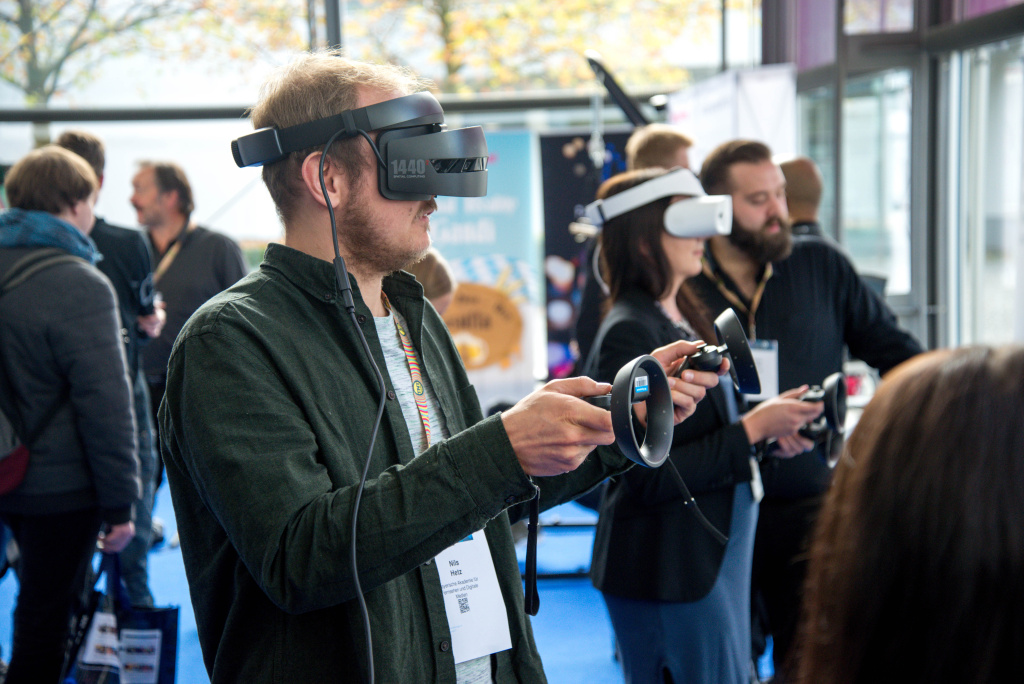Blog
5 Game-Changing Benefits of VR in Modern Healthcare

The virtual area of healthcare is rapidly evolving, continuing to be the key catalyst in transforming patient experiences and enhancing outcomes. The pandemic period brought innovative features to the virtual care field. Offering great benefits to both patients and doctors, VR has begun a gripping journey within the healthcare sphere.
HERE ARE 5 FRESH EXAMPLES OF SUPPORTIVE POWER OF VR IN HEALTHCARE:
1. Pain Management and Distraction
Managing pain is a significant challenge, especially during medical procedures or physical therapy. VR technology provides an effective distraction tool by transporting patients into virtual environments that engage their senses and divert their attention from discomfort. A recent medical study approved by MSU revealed incredible results of VR helping in distraction. Researchers compared traditional hospital carpal tunnel surgery under anesthesia with awake surgery using local anesthesia and optional VR immersion. Among 404 patients, traditional surgery had a less positive experience, while awake surgery with VR showed higher enjoyment and reduced anxiety. This innovative approach may reduce the need for general anesthesia.
2. Enhanced Medical Training and Education
Healthcare professionals require extensive training and education to provide quality care. But traditional methods often fall short in simulating real-world scenarios. VR technology offers a realistic and safe training environment, enabling medical practitioners to practise complex procedures, surgical techniques, and emergency response protocols. The German healthcare provider Sana Klinken AG is a great example of this transformative experience. Sana's technology CareVR 1.0 enables single or multiple users to navigate an OR, interact with medical devices (like X-ray, anesthesia machine, and OR table), and enhance education. Each device offers text instructions and interactive features, so rainees and instructors can practise scenarios like preparing sterile OR supplies or tracking gauzes, simulating real-world situations safely.
3. Mental Health Therapy
VR-based exposure therapy revolutionises mental health treatment by offering controlled environments for addressing phobias, anxiety disorders, and PTSD. Patients confront fears safely, gradually reducing emotional impact and developing coping strategies. Therapists can personalise treatments, enhancing therapy effectiveness and providing a comfortable, engaging space for patients to overcome their challenges. The Virtual Reality Medical Center (VRMC) has implemented virtual reality exposure therapy (VRET) to treat phobias such as fear of flying, heights, and public speaking. Step by step, through controlled and immersive VR environments, patients are opening to their specific fears in a safe and controlled manner. This allows them to confront and manage their anxieties effectively.
4. Telemedicine and Remote Care
VR technology enables healthcare providers to offer immersive telemedicine experiences, bridging the distance gap between patients and specialists. Through virtual consultations and remote monitoring, patients can receive timely care, reducing the need for travel and minimising healthcare disparities. University of Sheffield's 'MediTel' technology utilises VR-equipped robot technology for remote medical treatment in dangerous environments. This rapid-response system ensures patient assessment, vital checks, and data streaming, redefining remote healthcare.
5. Rehabilitation Improvement
Rehabilitation Improvement is at the forefront of medical advancement with the integration of virtual reality. This technology is reshaping the way patients recover from strokes, brain injuries, cognitive disorders and undergo physical therapy. By immersing individuals in tailored virtual environments, VR facilitates targeted exercises that enhance cognitive abilities, improve attention, muscle strength and overall functional outcomes. A NeuroReality Company provides its VR Rehabilitation Services through gamification - an innovative 'Koji's Quest. Through a series of guided activities, patients work to restore cognitive skills vital for their daily lives.
Virtual Reality technology is revolutionising healthcare by solving the challenges faced by healthcare companies today. From enhanced training and pain management to mental health therapy and remote care, the benefits of VR in healthcare are far-reaching.
Wide opportunities of VR in Healthcare will be uncovered during the Healthcare Automation and Digitalization Congress: AUTOMA+ 2023 at the brand new workshop “Training the health professionals of tomorrow with virtual reality” hosted by Sana Kliniken AG.
Join the workshop on 26 September 2023 in Zurich, Switzerland and have a chance to dive into the transformative experience of VR in Healthcare.
Register now: https://bit.ly/3PgiD1v